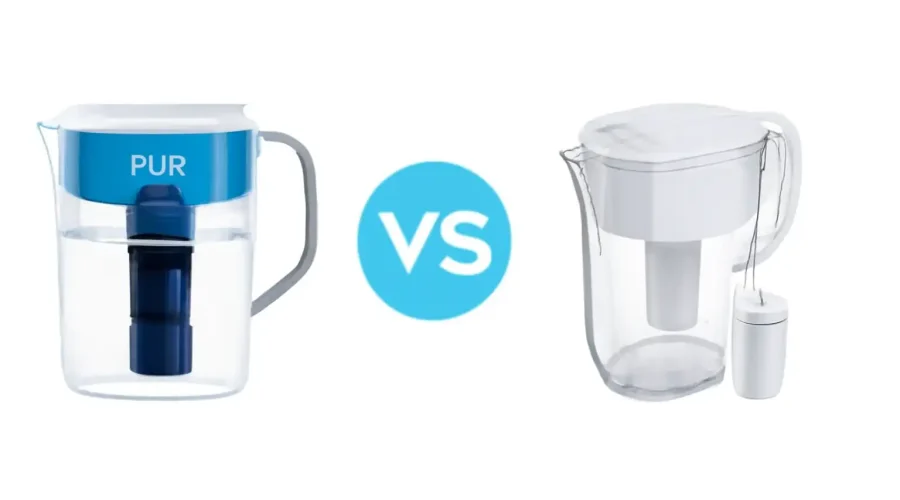Introduction | Brita vs Pur Comparison
When it comes to filtered water, we all want the cleanest and safest option. This is especially true if you’re worried about the taste, odor, or contaminants in your tap water. I’ve personally used both pitchers over the past year, and the Brita vs Pur debate is real. I started with Brita because it’s easy to use and more affordable than many other home filtration systems.
After reading a Reviewed.com comparison, I realized that Brita vs Pur isn’t just about brands. They use different filtration technologies. So, I decided to test both myself. While Brita worked well for basic filtering, I noticed that Pur removed more chlorine taste and heavy metals. The difference was clear in my apartment with older plumbing.
The truth is, there’s no one-size-fits-all answer to Brita vs Pur. It really depends on your local water quality and what you’re looking to filter out. If your water doesn’t have serious issues, Brita might be good enough. But if you’re dealing with stronger contaminants, Pur could be the better option.
If you’re still unsure, I recommend trying both. That way, you’ll know for yourself which pitcher works best in the Brita vs Pur comparison.
Why Use a Water Filter Pitcher?
After years of drinking tap water, I started to notice a strange taste and occasional odor. It made me question what I was really consuming. While bottled water seemed like an option, it felt expensive and created too much waste. That’s when I started comparing Brita vs PUR to find the best water purifier pitcher. Both are trusted names, but they each have their own strengths.
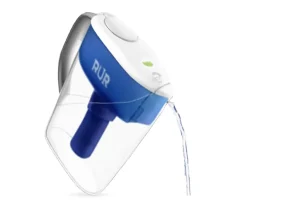
Brita vs PUR is a common debate Brita often focuses on improving taste, while PUR is praised for filtering out more contaminants. Using a water filter pitcher became part of my routine. I could enjoy filtered water Brita style clean, better tasting, and ready in minutes. It replaced my need for bottled water and felt like a smarter, more sustainable choice. Check out smart product reviews and comparisons on Deep Dive Picks to make more informed choices.
In the Brita vs PUR comparison, PUR seemed to filter faster, but Brita delivered a crisp taste I loved. Choosing Brita vs PUR really depends on your needs: whether you care more about taste, filter speed, or overall water quality. Either way, switching to a filter pitcher felt like a simple luxury with big health benefits.
What Are the Benefits of Filtering Water?
When I first moved into my apartment, I didn’t think much about the water. But after a few months, I noticed the taste was off, sometimes metallic, sometimes just stale. That’s when I started searching for the best option between Brita vs PUR. I quickly learned that water filtration isn’t just about taste it’s also about long-term health. Both brands aim to remove harmful contaminants like lead, chlorine, and mercury.
Brita vs PUR became my main focus because PUR often filters more thoroughly, while Brita offers faster results with consistent performance. Cost and convenience were just as important to me. Buying bottled water every week was expensive and added to plastic waste. Switching to a water filter pitcher helped lower costs and reduce plastic use.
Between Brita vs PUR, both offer eco-friendly, budget-friendly solutions. Taste was the final factor that sealed the deal for me. My coffee, cooking, and even my dog’s water bowl all tasted better. Brita often gives a crisper finish, while PUR has a more neutral flavor. Choosing between Brita vs PUR really depends on what matters most to your daily routine.
Exploring PUR Filter Models and Performance
After trying many water filters over the years, I found Pur to be one of the more interesting options. Not just because of its wide range but also how it makes cleaner water more accessible. If you’re new to Pur, they offer models like the Pur Classic, Pur Basic, and the Pur Ultimate. Each is made for different needs, whether you’re on a budget or want advanced features.
When I did a hands-on review, the Plus filter stood out. It noticeably improved the taste of tap water, especially in hard water areas. The Plus filter reduces more contaminants than standard ones, and you can really taste the difference. When comparing Brita vs Pur, one key point is filtration depth. Pur seems to focus more on multi-stage filtering. In my Brita vs Pur experience, Pur filters took a bit longer to purify the water, but the result tasted fresher.
The Pur Classic and Pur Basic are good for removing chlorine taste and odor, while the Pur Ultimate offers layered filtration for added protection. Another win in the Brita vs Pur debate is that Pur makes it easier to find replacement filters. If you’re deciding between Brita vs Pur, and want stronger contaminant removal, Pur is a solid and practical choice.
What is Brita?
If you’ve ever wondered what a Brita is, it’s a trusted brand known for making water filters that improve the taste and quality of tap water. I first tried Brita when I moved into my first apartment and didn’t enjoy the tap water taste. I picked up a Brita Everyday pitcher and immediately noticed the difference. It was affordable and easy to use. Over time, I also tried different filters like the Standard and Brita Elite.
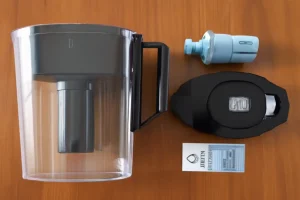
The Standard filter is great for everyday use and pairs well with the Brita Ultramax. When comparing Brita vs PUR, the Brita filter feels more reliable in terms of ease and accessibility. The Brita Elite stood out to me because it lasts longer and removes more contaminants. If someone asks, is Brita filter good, I’d say yes it gives me peace of mind about the water I drink.
When it comes to Brita vs PUR, I’ve found Brita to be more consistent and user-friendly. For families, the Brita Grand works great, while the Brita Everyday is ideal for individuals or small households. Having tested these myself, I find Brita filters dependable. If you’re debating Brita vs PUR, consider your lifestyle needs. In my experience with Brita vs PUR, Brita made a big difference in my daily water routine.
Brita vs PUR Real Life Test Results and Water Quality Insights
When I first started comparing water filter pitchers, I focused more on convenience than anything else. But over time, water purity became the biggest concern for my family. In the debate of Brita vs PUR, both promise clean drinking water, yet their filter performance differs. I’ve personally tested both in an older home with questionable tap water. PUR filters noticeably improved the taste and seemed more effective at removing heavy metals like lead. It felt as if the contaminants were completely gone.
Brita did improve the taste too, but it didn’t reach the same level of purity, especially when it came to filtering out pharmaceuticals, something I hadn’t even considered until reading lab results. Another thing I noticed in the Brita vs PUR comparison is how each handles long-term use. Both brands claim to reduce particulate matter in tests, sometimes described as “ants reduced” not actual insects, but tiny particles in the water
Brita kept the water clear, but PUR stayed clearer longer without clogging. From my experience, if you care about removing things like medication residues or metals, PUR is the better choice. Still, Brita holds up well for everyday use, especially in areas with relatively clean tap water. It really comes down to how deep you want your filtration to go. In the ongoing Brita vs PUR conversation, both have strengths depending on your water needs.
How Do Pur and Brita Compare in Reputation?
Brita vs Pur has become a common debate among people looking to improve their drinking water. When I first looked into water filters, I didn’t realize how different they could be in the types of contaminants they remove. While both are trusted brands, Brita vs Pur shows a noticeable difference in their filtration targets. Pur filters tend to focus more on removing industrial pollutants, lead, and mercury, which can be critical if you live near factories or in older homes.
The Pur Plus filter is especially strong at handling things like microbial cysts and pesticides, giving extra peace of mind for families with young kids or elderly members. Brita filters, on the other hand, often focus more on taste improvement and removing chlorine and common metals. In my own test, the water from my Brita faucet filter tasted noticeably better, especially after filtering city tap water.
However, not all Brita filters remove the same contaminants, so checking the certification on the box is important. In the Brita vs Pur discussion, it often comes down to what your water needs most. If you want extra protection from a wide range of chemicals, Pur may be more suitable. But if you’re mainly after better taste and everyday filtering, Brita offers solid performance. Either way, understanding what your local water contains helps you make the right call in the Brita vs Pur decision.
Why Pur Water Filters Stand Out for Home Use
After personally using both Brita and Pur pitchers, I found some clear differences that help in daily life. In the Brita vs Pur comparison, Pur pitchers stood out for their thoughtful design. The Pur Basic is very simple to use, while the Pur Classic has a comfortable grip that made pouring easier. I liked how the lids on both models stayed secure, even when the pitcher was full and stored up high. These small design touches made a real difference.
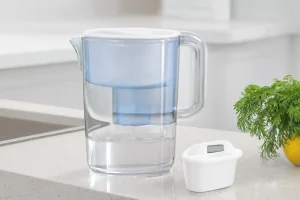
One key point in my Brita vs Pur experience was the filtration power of the Pur Plus filter. It removed the chlorine taste from tap water really well and also helped filter out harmful substances like lead and mercury. That gave me more trust in the product.
The Pur Ultimate model holds more water, so you don’t need to refill it as often, although it does feel heavy when full. Overall, when looking at Brita vs Pur, I believe Pur pitchers offer better everyday use through features like larger reservoirs, secure lids, and improved filtration.
What are the Key Features of Brita Water Filter Pitchers?
-
After comparing Brita vs PUR, I leaned toward Brita for its smart design and everyday usability.
-
The Brita Grand pitcher has been my go-to for over a year perfect for families with its large capacity and easy-to-use lid.
-
I gifted the Brita Everyday to a college student; it’s ideal for dorm life due to its lightweight design and simple filter replacement.
-
If you’re deciding on the best Brita pitcher, it depends on your preferred filtration system and filter lifespan.
-
Brita Elite lasts up to 6 months, reducing the need for frequent replacements.
-
Standard filter is more budget-friendly but needs changing every 2 months.
-
From a personal standpoint, I found Brita Elite vs Standard also differs in water flow — the Elite offers a smoother, faster pour.
-
If you’re stuck between Brita Standard vs Elite, go with Elite for convenience or Standard if you want to save money.
-
Overall, in the Brita vs PUR debate, Brita wins for me because it’s easier to match a pitcher to different needs from Brita Grand for families to Brita Everyday for individuals.
-
The difference really comes down to performance, pitcher size, and how often you want to deal with replacing filters.
-
When asked about Brita vs PUR, I always recommend trying Brita first it’s been a reliable part of my daily routine.
Comparing Filter Costs and Long-Term Value
How Much Do Pur and Brita Water Filter Pitchers Cost?
When comparing Brita vs PUR, the first thing most people notice is the pitcher price. From my own shopping experience, the cost can vary depending on whether you buy it at a local store or order online. The Brita Everyday is often seen as a more advanced option and usually comes with a slightly higher price tag.
It’s popular in many Brita filter reviews and consistently delivers clean and great-tasting water. In contrast, the PUR Classic is a more budget-friendly choice and is known for its lead removal capability, which makes it a solid option if you’re looking for value. If you’re buying your first water pitcher, decide whether to purchase it in-store or online. Online shopping usually offers more model options, while stores may have better deals.
Both Brita vs PUR pitchers reflect their price through their quality and performance. Keep in mind that over time, you’ll also need to purchase replacement filters, which adds to the overall cost. When choosing between Brita vs PUR, consider the long-term value, water taste, and filtering performance. Both brands have strong offerings, but your choice depends on your budget and water quality needs.
Why More Users Prefer Pur in the Brita vs Pur Debat
When comparing Brita vs Pur, many users lean toward Pur filters, especially the faucet models, for their strong performance and ease of use. I’ve tried both the Pur Basic and the Pur Plus, and the difference was noticeable. The water tasted cleaner, fresher, and had no odd aftertaste. In the Brita vs Pur debate, more people are starting to prefer Pur because of how well it removes contaminants like lead and mercury.
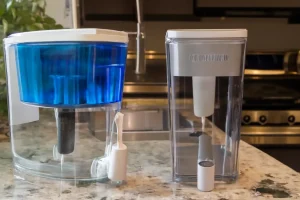
User reviews often praise Pur pitchers for delivering safer and better-tasting water. The Pur Basic is easy to install and perfect for everyday use. But if you’re looking for extra filtration, the Plus filter is a clear upgrade. I switched myself and noticed a quick improvement in water clarity and smell. Based on personal use and feedback, Brita vs Pur discussions often end with Pur coming out ahead for both quality and peace of mind.
What Do Users Say About Brita Water Filter Pitchers?
When choosing between Brita and Pur, many people lean toward Brita filters simply because of how well-known and easy to use they are. From personal experience using both the Brita Everyday and the Brita Grand, I’ve noticed how each model fits different lifestyles. But what truly gives Brita an edge is what people consistently mention in Brita water pitcher reviews.
The Brita Everyday is a favorite for those who want something simple and light. It fits well in most fridges and doesn’t require much effort to refill or clean. Many users appreciate its practicality and value. The Brita Grand, on the other hand, is popular for its larger capacity. People with bigger families or higher water needs often go for this one because it saves them from frequent refills or buying bottled water all the time.
One model that really stands out in reviews is the Brita Elite. Users love that it lasts longer than standard filters, which means fewer changes and more peace of mind. I’ve personally used the Elite, and I noticed a clear difference in how fresh and clean the water tasted. It’s a good pick if you want long-lasting performance without too much maintenance.
Brita vs Pur in Sustainability and Smart Filter Design
When choosing between Brita and Pur, sustainability should matter as much as water purity. I’ve used both in my kitchen, and while they each work well, the real difference lies in the filter cartridges. Both brands help reduce plastic waste, but that depends on how regularly users replace the filters. Brita includes a smart light that alerts you when it’s time to change the filter, which helps maintain both efficiency and consistency.
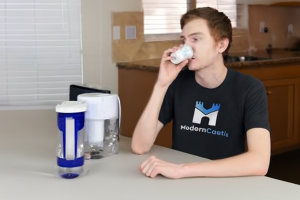
In contrast, Pur often needs manual tracking, and I’ve noticed that can delay filter changes. This affects not only the filter performance but also its overall environmental impact. If you’re looking for a Brita alternative, it’s worth comparing how each brand handles design and materials. Pur’s filters are slightly bulkier, which might lead to more waste over time.
Brita’s slimmer design and recycling options show a stronger focus on reducing waste. Both are good for long-term use in the kitchen if you stay consistent with filter changes and pay attention to filter lifespan. In the end, it’s not only about picking the right brand. It’s also about how mindful you are in your everyday use.
How Do They Compare in Terms of Plastic Waste?
When I first started looking into water filter options, my main goal was to reduce plastic waste in my home. It was not just about clean water but also about how much trash we create while trying to stay healthy. I have tried both Brita and PUR, and I noticed their approach to environmental concerns feels quite different.
What surprised me most was how often I had to deal with filter replacement costs. Both brands require regular changes, but PUR seemed to need replacements a little more often depending on the model. That means more used filters and more plastic waste. Brita has made progress by offering recycling programs and making it easier to dispose of used filters.
PUR has recycling options too, but they are harder to find and not as easy to use. If you want a Brita alternative, look into filters that last longer or use stainless steel cartridges. I explored those when I saw how much plastic was adding up, which made me think more about what clean water really costs.
FAQs
Which Water Filter Pitcher is Best for Your Needs?
The best water filter pitcher depends on your specific concerns whether it's taste, lead removal, or filter lifespan. For peace of mind and top-rated performance, consider a best rated water filter pitcher that matches your tap water's needs.
Is There a Clear Winner Between Pur and Brita?
Pur generally offers better contaminant removal, while Brita often has longer filter life and lower replacement costs, according to Reviewed.com. The best choice depends on whether you prioritize purity or convenience.
Is PUR filter better than Brita?
PUR and Brita filters both improve tap water quality, but PUR generally filters out more contaminants, including some harmful chemicals like benzene and industrial pollutants.
